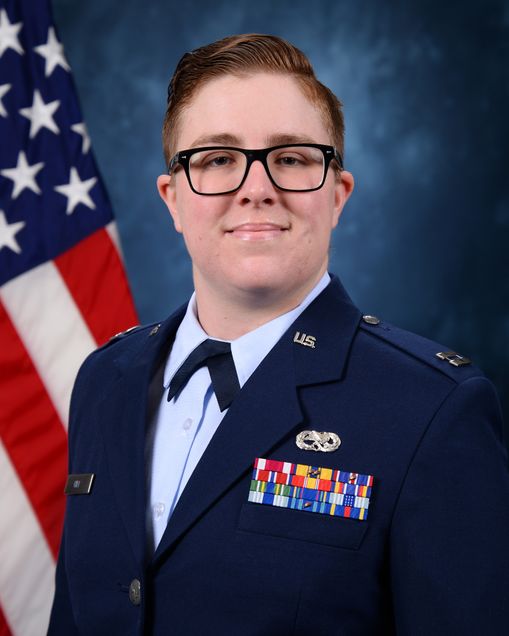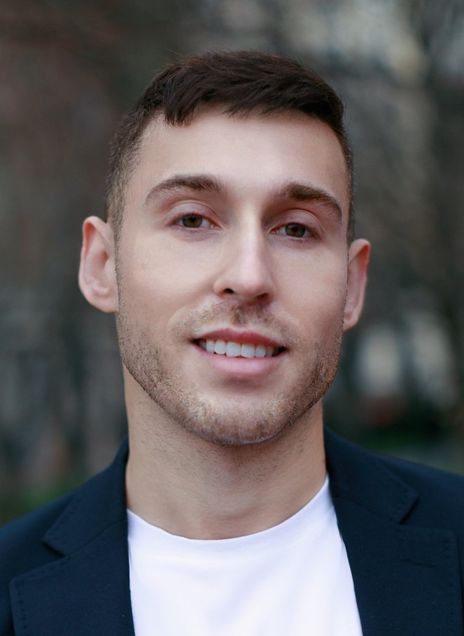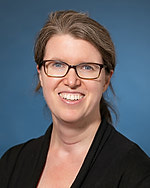Distinguished Alumni Award
BUA’s Distinguished Alumni Award, launched in 2022, annually celebrates an alumnus/a who best exemplifies the values of BUA and has used those qualities to make an impact on the community and world around them. Nominations for the award are solicited from the entire alumni community, and recipients are selected by the BUA Alumni Council.
Previous recipients of the Distinguished Alumni Award:
2024-2025: Major Lydia Hill ’11
 Major Hill graduated from BUA in 2011 and went on to the United States Air Force Academy, where she received her commission in 2015 as a distinguished graduate. Major Hill left her own legacy at USAFA, founding the Spectrum Alliance for LGBTQIA cadets, which is still in operation today. Major Hill has worked with KC-135s and F-16s as an Aircraft Maintenance Officer, served as a Wing Executive Officer, has deployed in support of named operations worldwide, and been stationed in England, South Korea, Illinois, and San Diego. She holds two master’s degrees: an MA in Psychology from San Diego State and an MA in Professional Counseling from Lindenwood University. Major Hill currently serves as an Instructor in the Department of Behavioral Sciences and Leadership at the Air Force Academy in Colorado Springs, Colorado.
Major Hill graduated from BUA in 2011 and went on to the United States Air Force Academy, where she received her commission in 2015 as a distinguished graduate. Major Hill left her own legacy at USAFA, founding the Spectrum Alliance for LGBTQIA cadets, which is still in operation today. Major Hill has worked with KC-135s and F-16s as an Aircraft Maintenance Officer, served as a Wing Executive Officer, has deployed in support of named operations worldwide, and been stationed in England, South Korea, Illinois, and San Diego. She holds two master’s degrees: an MA in Psychology from San Diego State and an MA in Professional Counseling from Lindenwood University. Major Hill currently serves as an Instructor in the Department of Behavioral Sciences and Leadership at the Air Force Academy in Colorado Springs, Colorado.
Major Hill has maintained her connection to BUA. In 2021, she returned to address the community at a Veterans Day all-school meeting. In her remarks, Major Hill spoke openly about mental health issues, LGBTQIA inclusion, and leading a life of service. She reflected on BUA as being “the first place I really saw people step up and be agents of change,” and shared her gratitude for a BUA teacher who inspired her “by living his life openly and with courage.” Major Hill’s candid reflections received an enthusiastic reception from the BUA audience, with students expressing their deep appreciation in the Q&A following her talk.
2023-2024: Jon Freeman ’04

Jon Freeman is a social neuroscientist and associate professor of psychology at Columbia University, where he directs the Social Cognitive & Neural Sciences Lab. He received his BA from New York University in 2007 and his PhD from Tufts University in 2012. His research examines the human brain mechanisms underlying snap judgments, first impressions, and unconscious bias using neuroimaging, computational modeling, and behavioral paradigms. His work has made several discoveries, such as how the brain processes a person’s trustworthiness outside conscious awareness, or how stereotypes and prior social experiences can create distortions in the brain’s visual system. He also developed a novel technique that uses hand movements to uncover how split-second decisions unfold over fractions of a second in the brain, which is now widely used by the scientific community.
Jon is the author of nearly 100 peer-reviewed publications and the recipient of a number of awards, including the National Science Foundation CAREER Award, the Association for Psychological Science’s Janet T. Spence Award for Transformative Early Career Contributions, the Federation of Associations in Behavioral & Brain Sciences’ Early Career Impact Award, and other distinguished awards from the Social & Affective Neuroscience Society, the Society for Personality & Social Psychology, the International Social Cognition Network, and the Society for Social Neuroscience. His research is frequently funded by the National Institutes of Health and National Science Foundation and has appeared in media outlets such as the New York Times, Washington Post, Wall Street Journal, and TIME Magazine.
Jon is also leading national advocacy on the challenges that LGBTQ+ people face in the STEM workforce and on policymakers’ blind spots in resolving these disparities. Since 2018, he has been working to have sexual orientation and gender identity demographics incorporated into official data collection and reporting systems of the U.S. government and higher education that are used to ensure the equity and inclusion of underrepresented groups in STEM. He has raised public attention on these issues with op-eds in Science, Nature, and Scientific American, authored extensive formal requests to the government, facilitated the House of Representatives’ passing of the LGBTQ+ Data Inclusion Act on behalf of 90 scientific organizations, and regularly works with federal agencies and the White House on STEM diversity issues. Due to Jon’s efforts, for the first time since 1957 every graduating PhD student at every US university will soon voluntarily be asked their sexual orientation and gender identity on the government survey required to graduate. Such data will have the power to create transformative change in the equity of LGBTQ+ people in STEM and higher education. For this work, Jon was recognized as the 2019 LGBTQ+ Scientist of the Year by Out to Innovate for his “exemplary, cross-disciplinary scientific contributions and his public advocacy on behalf of LGBTQ+ people in STEM.”
2022-2023: Dr. Magdalena Slosar-Cheah ’99
 Dr. Slosar-Cheah grew up in Massachusetts, daughter of a puppeteer and an architect and the oldest of three sisters. After graduating from Boston University Academy in 1999, she obtained her BA in physics at Yale University, where she also enjoyed taking classes in medical anthropology, modern literature, and Anglo-Saxon, and her MD from the medical school at the University of Massachusetts (now UMass Chan). She subsequently completed her internal medicine residency at New York-Presbyterian/Weill Cornell in Manhattan followed by a fellowship in infectious diseases at Montefiore/Einstein in the Bronx.
Dr. Slosar-Cheah grew up in Massachusetts, daughter of a puppeteer and an architect and the oldest of three sisters. After graduating from Boston University Academy in 1999, she obtained her BA in physics at Yale University, where she also enjoyed taking classes in medical anthropology, modern literature, and Anglo-Saxon, and her MD from the medical school at the University of Massachusetts (now UMass Chan). She subsequently completed her internal medicine residency at New York-Presbyterian/Weill Cornell in Manhattan followed by a fellowship in infectious diseases at Montefiore/Einstein in the Bronx.
Upon completing her medical training, Dr. Slosar-Cheah continued to work at Montefiore for six years as an attending physician in infectious disease, where she saw general infectious disease consults, cared for a panel of patients living with HIV, and helped expand hepatitis C treatment into primary care. In addition, she ran the second year microbiology course for medical students at Albert Einstein College of Medicine for two years.
After 11 years in New York City, Dr. Slosar-Cheah moved back to Massachusetts in 2019 to take up a faculty position as Assistant Professor of Medicine in the Division of infectious diseases and immunology at UMass Chan Medical School/UMass Memorial Health, where she continues to see patients and serves as program director for the infectious diseases fellowship. During the pandemic, Dr. Slosar-Cheah managed the hospital COVID-19 team, shaped hospital policies, and treated COVID-19 patients.
She is also a wife to a fellow physician, the mom of a kindergartener and a toddler, an aspiring gardener, and is currently pursuing a master’s degree in the history of medicine.